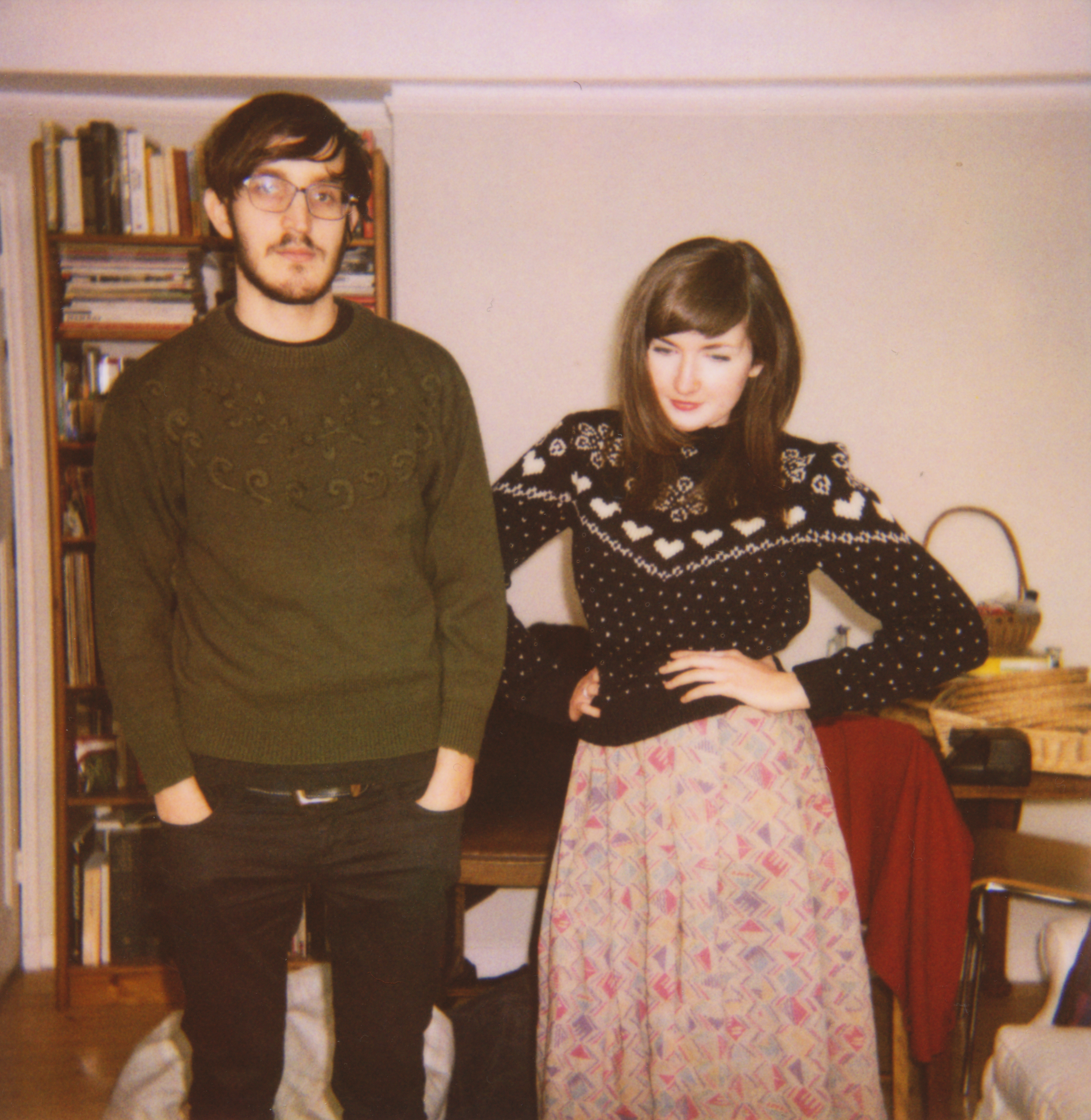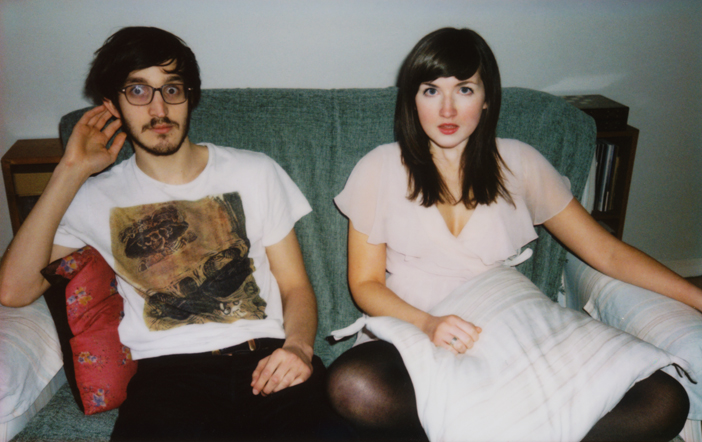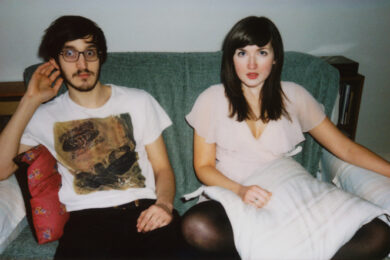To sign up for this particular Summer Camp is to enter a world of 80’s teen angst (bad hair and comedy tank tops), soundtracked by dreamy electro-pop and hosted by two beautiful twenty-somethings. Jeremy Warmsley had been creating his thoughtful electronica for a number of years but when his friend, the actress and journalist Elizabeth Sankey, suggested they record a song Summer Camp was born.
Quickly picked up by a hyper-salivating blogworld, the band member’s identities were initially shrouded in mystery. Debut single ‘Ghost Train’ was a beautiful slice of melodrama and after a summer spent camped out on the festival circuit, the recently-released EP Young (on the Moshi Moshi label) has further enhanced their reputation. The Summer Camp sound is swathed in nostalgia for teenage years in all their awkward glory, a love of the 80’s brat-pack film genre (one track begins with a sample of a Molly Ringwald line) and an ear for a swooningly good pop hook.
I’m sat with Jeremy and Elizabeth in the bedroom of the artist ‘living quarters’ at Manchester’s Deaf Institute. The venue has its own eye on the past – glorious flock wallpaper, vintage speakers and a huge disco glitter ball – such that it is already Summer Camp’s favourite venue.
For the interview we are perched on bunk beds, and various members of co-headliners Frankie And The Heartstrings interrupt us to delve into a collection of rucksacks and man-bags. Jeremy and Elizabeth are great fun; confident in their passions and happy to be “not very rock ‘n’ roll.” After we’re done, Elizabeth offers me one of the Halloween cup-cakes she’s been given. We all stare at the bright orange icing and decide against it. Forget Ecstasy, we are more worried about e-numbers.
Later on, their set is hugely impressive; Elizabeth’s voice seems stronger live and Jeremy is nimble in his constant switching between instruments. They play with a projected backdrop of hundreds and hundreds of constantly changing random photos of American families – which appear to have all been taken in the 1980’s.
Indeed, even though Summer Camp have only existed for a year, it seems appropriate to start by delving into their past.
I believe you have known each other for a while, but only started making music together about 12 months ago?
Elizabeth Sankey: Yeah, we’ve known each other for five years. The band came about as an accident. We had a weekend free and I played Jeremy this song by The Flamingos called ‘I Only Have Eyes For You’ and we thought we’d cover it. As Jeremy was finishing off the mix of it, I thought I’d set up a MySpace page. I set it up and used photos which were not of us. For some reason MySpace had the default [country of origin] as Sweden and I said we were seven friends who had met in summer camp when we were 14.
So, this is when the well-reported story of your supposed mysterious anonymity began to take shape?
ES: Yeah, but the reason we were anonymous was that we didn’t want anyone to find it. We made the MySpace because we thought it would be nice to have it up there, so in five years time we can look at it and go ‘I can’t believe we did that’. But it got found by [the] Transparent [blog] within half an hour. Then we were getting these emails from people written in Swedish and trying to write back using an online translator. They would write back and say ‘you’re not from Sweden are you?’
Was there a sense that the online response was, in some way, forcing you to take Summer Camp more seriously as a project?
Jeremy Warmsley: It sounds a bit facile to say [adopts posh accent] ‘the public attention was so much, that we simply couldn’t let them down and we had to continue’. It wasn’t like that; it was just fun and really exciting because people we liked were giving us really nice feedback. That is exciting for an artist to have people saying that they like you. All the songs on the EP were written in the first two months of our existence – in November and December of last year – and it was really, really fun and we couldn’t stop writing.
Jeremy, you have been making music for a number of years, was there a sense of achievement when Summer Camp seemed to capture people’s imagination almost immediately?
JW: Yes, we are both quite driven people and we both tried hard in the past with our separate endeavours to make stuff happen.
ES: And failed.
JW: And failed. It was almost a bit galling as people really liked this thing we were doing for a laugh.
There seems to be a strong image you have created for Summer Camp, both sonically and visually. There are a number of references to John Hughes’ films and a nostalgia for the 80’s in the images you use during your live set. Why is this so important to you?
ES: We really like the idea of having a world that you take people into. So, we liked using the samples from the films because it immediately changes your perception of what the song is going to be, as you are hearing something that reminds you of something else.
JW: For me it’s like a fantasy world. We weren’t teenagers through the 80’s so it like being nostalgic or homesick for something that never really existed. A lot of the music I love and Elizabeth loves, you kind of go off into a little world. It’s like being lost in a book or a film. That’s the feeling we are trying to evoke on this EP at least.
And the references to John Hughes, in particular?
ES: Basically, what I love about his films is that they are really timeless. He was amazing at taking universal themes for teenagers, and with relationships in general, and turning them into something hilarious and edgy, and putting them into this amazing world and taking people into that world. They were funny and edgy but they were really comforting and I think they are masterpieces.
One of your songs ‘Veronica Sawyer’ (from the Young EP) seems to explore some difficult concepts about entering adulthood. It describes someone surveying a bad party, and ends with the refrain “I’ll never be young again / I got so much more than this.” Is this a rejection of your teenage years?
ES: That’s very astute. It was basically a party I went to that I remember really clearly. I was getting really sick of going out. I was at this party and everyone had Polaroid cameras and all the boys were wearing Letterman jackets, even though they came from South London. So, it was that thing of being at parties and just looking round and thinking ‘God, this is really horrible and I don’t want to be here anymore. Does that mean I’m getting older? I guess it does and that’s a bit weird, but I don’t want to be young if this is what it’s going to be like.’
JW: Your mum thought it was an anti-drinking song.
ES: Yeah, mum was like ‘I love that one that is anti-drugs and anti-drinking and stuff’ and I was like ‘Hmm, OK mum’.
Have your folks been supportive of Summer Camp?
ES: Yes, really supportive and both our dads play instruments and stuff, so they are really into it. It is really nice in a way that the music that we make can be something that they are into.
JW: We are not very punk rock, you know.
ES: I’ve never been. My favourite ever band is Blur. All my friends were into Sean Maguire and I just thought Blur were the best thing in the whole world. I remember I got Parklife on tape for Christmas. My parents wanted to put it on in the car, and I wouldn’t let them play it because I thought they’d think it was too controversial and they’d think I was going off the rails.

When I listen to the Young EP, there seems to be references to 80’s electro-pop, be it Altered Images or even early Depeche Mode. With your obvious love of that decade, was there a conscious decision to create a sound for Summer Camp?
JW: We do love a lot of 80’s electro-pop bands, but we’ve never tried to be dictatorial of what the music’s going to be like. We’ve been quite happy to just see what happens. We haven’t ever said we want this to be really 80’s. It’s been determined by the equipment we have at our disposal and it just comes out that way.
How have you approached playing gigs? How have your transferred your sound to a live setting?
JW: The first few gigs we did we had a live drummer, a bassist and a second keyboard player. I was playing keyboards and guitar. We tried that for a bit, but basically it didn’t really sound like us. So now, it’s just the two of us and I think it sounds a lot more like us. Also, and this is not a very rock ‘n’ roll thing to be concerned about, but the logistics are a lot easier, especially when you are a young band with no budget.
And can we expect an album in the near future?
ES: Hopefully, we’ve been writing all year. It’s just finding the people who want to help us. We really want to produce it, but we feel like we want someone to help. The Moshi people have been amazing.
JW: We’ve only been a band for a year, so it is pretty rare for a band to have a record deal who’ve only existed for such a short time. So, I’m not worried about it.
ES: We’ve been really lucky so far and worked with people we’ve liked and trusted. I’m so scared of the music industry. We’ve gone out of our way to make sure that everyone we’re with are people who are not gonna drop us. We want to have the opportunity to grow; to make mistakes and not have it the be all and end all.
And how are the newer songs sounding, are they an evolution of the tracks on the Young EP?
ES: Our influences have broadened slightly, we are not just writing John Hughes-influenced stuff. What we’d really like to do on this album is be the same band but release the next set of songs we are happy with. Maybe just try and step it up a level. We still want it to sound like us.
JW: It’s recognizably the work of the same band but it is better.
Finally, in the name of investigative journalism, I looked at Jeremy’s Wikipedia page. I was fascinated to learn that you had supported Luther Vandross in 2006, one year after his death. That must have been a fabulous experience?
JW: Is that what it says? Ha ha. For some reason I get quite a lot of vandalism on my Wikipedia page. It said recently that my dad was on Casualty, that I was the vice-president of the Bromley Tea Society and that I wrote ‘I Believe I Can Fly’ by R Kelly.



